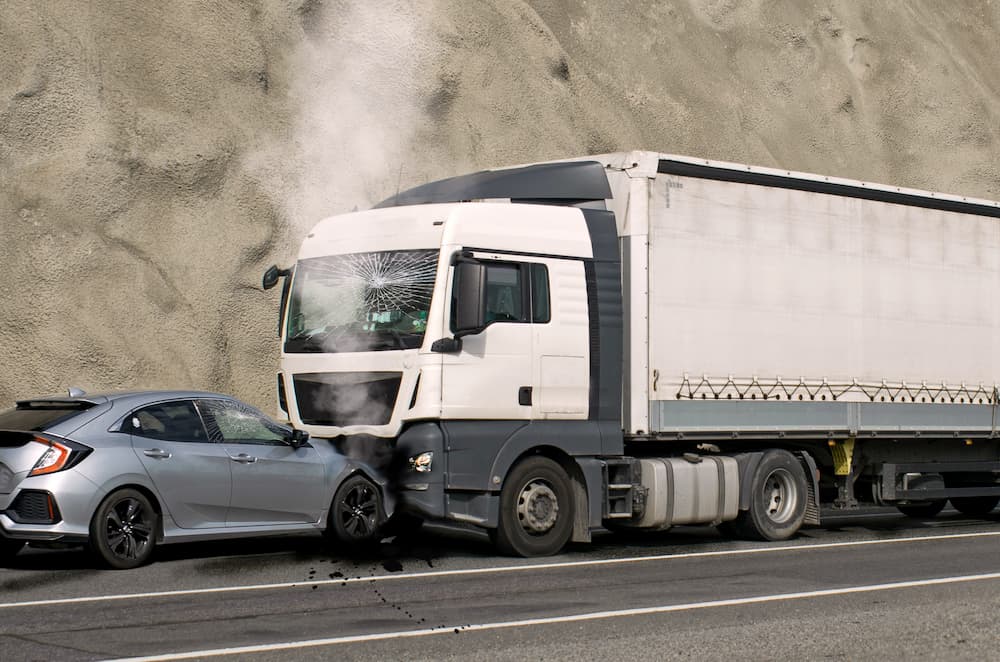- What is business interruption insurance?
- What does business interruption insurance cover?
- What isn't covered by a business interruption insurance policy?
- Types of business interruption insurance policies
- How does business interruption insurance work?
- Benefits of business interruption insurance
- How much does business interruption insurance cost?
- Companies that offer business interruption insurance
- How to choose the right business interruption insurance coverage
- How to save on a business interruption insurance policy
- How to file a business interruption insurance claim
- Business interruption insurance vs. other types of business insurance
- What our expert says
- FAQs
What is business interruption insurance?
If your business is unable to operate normally because of physical damage to your property, business interruption insurance covers your operating expenses and lost income for a limited period.
If your business is damaged by a storm or fire, you likely have some protection through business property insurance. These policies cover repairs or replacement to physical property, such as your building premises or equipment, However, property insurance doesn't provide coverage for lost income that results from temporary closures, so you could be on the hook for your payroll and operating expenses without any income coming in.
That's where business interruption insurance comes in; it can keep your business afloat if an emergency pops up.
Business interruption insurance can be purchased as standalone coverage, or added as an endorsement or rider to your business owner’s policy.
"All businesses may benefit from business income coverage," Hammer says. "However, those with a physical location used as a retail store front, restaurant, or similar locations where customers come to the business for products or services and businesses that rely on a physical location to produce a product, a storage location or workshop may have a greater need for business income."
Consider this example: You own a clothing boutique in a small town. A fire occurs after a lightning storm, and your building is damaged, including some of your inventory. Thankfully, the building is salvageable, but your business has to close for six weeks for repairs. During this period, you can't have customers on the premises. As a result, you lose income for the duration of the repairs, but you still have to pay for utilities and vendors.
With a business interruption insurance policy in place, you can submit a claim and receive money to keep the business afloat while waiting for the repairs to be completed and the business to reopen.

What does business interruption insurance cover?
Business interruption insurance covers expenses and lost income resulting from covered events that cause physical damage to your business. For example, policies cover damages related to the following:
- Fire
- Hail
- Lightning
- Storms or wind damage
- Theft or vandalism
What isn't covered by a business interruption insurance policy?
Business interruption insurance can provide critical financial support for your business, but these policies don't protect you in all circumstances. There are some exclusions you should be aware of before purchasing a policy:
- Epidemics and pandemics: Because of how widespread and unpredictable pandemics or epidemics can be, insurers usually exclude these issues from coverage, so the loss of income related to these events isn't covered.
- Power outages and equipment failures: Unless a power outage is related to a covered event, such as a storm damaging your power source, losses related to a general power outage are typically excluded. And, if you have equipment that fails or breaks, any losses related to those events also are excluded.
- Government shutdown or evacuations: If your small business has to close due to a government-ordered evacuation or shutdown, losses of income are usually excluded from basic coverage. However, you may be able to add civil authority coverage to your policy. This usually applies to business closures related to government-mandated evacuations or restricted access. For instance, if your business is on an island and there is flooding, the government may restrict access to the island, preventing business owners (and customers) from reaching it.
Types of business interruption insurance policies
There are other clauses or additional coverages you may be able to add to your policy:
- Contingent business interruption: CBI covers income losses related to supply chain disruptions. For example, if you rely on a certain manufacturer for your inventory and it has to pause operations due to hurricane damage to its warehouse, CBI would cover your lost revenue.
- Extended business interruption: EBI is an optional coverage option that provides partial reimbursement for the period between when your property is repaired, and before your income has returned to the pre-loss level. For example, say your business closed after a storm and the roof was damaged. Your business reopens weeks later, but business is slow because customers are still in the process of recovering from their own storm damage. EBI would help cover this slow period.
How does business interruption insurance work?
When there is physical damage to your business, such as a fire in a warehouse, the insurer will send a representative to assess the damage. The insurer will usually request copies of your financial records, such as your recent profit-and-loss statements, tax returns or business forecasts, and the insurer will use that information to determine your payout.
How much you'll receive depends on several factors, including:
- Lost income: If your business is unable to operate or is operating at a reduced capacity, the insurer may cover some of the lost income.
- Fixed costs: Since your business isn't earning its usual income, business interruption policies will cover some or all of your fixed expenses, such as rent, utilities and employee payroll.
- Additional expenses: If you have to incur additional expenses, such as renting equipment or leasing a temporary office space, business interruption insurance can help with the cost.
Benefits of business interruption insurance
The benefits of business interruption insurance are numerous. Two key benefits:
- Protection against loss of income: If your business has property damage and has to close, business interruption insurance provides coverage for your lost income, allowing you to keep paying your bills.
- Employee retention: If your business is affected by a storm, fire or vandalism and needs to temporarily close, business interruption insurance ensures your employees are paid; this can keep them with the company, rather than having to leave and find other jobs.
How much does business interruption insurance cost?
The cost of business insurance depends on several factors, including your location, business size, industry and the number of employees you have. Our analysis has found that small businesses that don't operate in high-risk fields pay about $50 to $150 per month for coverage.
Companies that offer business interruption insurance
Many major companies offer business interruption insurance. With some, the coverage is bundled with business owner’s policies, but others offer business interruption coverage as a standalone policy.
Companies that offer business interruption insurance include:
- Allstate
- AmTrust Financial
- Chubb
- Embroker
- The Hartford
- Liberty Mutual
- Nationwide
- Progressive
How to choose the right business interruption insurance coverage
When shopping for a policy, follow these steps:
- Assess your risk: Think about what risks may affect your business. For example, if you live in an area prone to storms, or have a building with older trees nearby, you may need to purchase a policy that specifically covers storm damage or structural damage.
- Review coverage limits: Consider the worst-case scenario, such as if your business had to close for three to six months. Make sure the policy would cover all of your expenses, including utilities, vendor payments, and payroll, for those three to six months.
- Understand exclusions: Business interruption policies don't cover all incidents, so carefully review the policies to see what events aren't covered.
How to save on a business interruption insurance policy
To save money on your policy, try these tips:
- Bundle coverage: Some companies offer discounts if you bundle your policy with other coverage, such as your commercial auto insurance.
- Increase your deductible: Your deductible is how much you have to cover out of pocket before the insurer will start paying the claim; increasing the deductible will lower your monthly premium.
- Reduce your risk: Assessing and addressing risks in your business, such as installing security systems, modern fire sprinklers or storm windows, can help reduce the risk of an incident – and the need to file a claim – and you may qualify for discounts.
- Shop around: Get quotes from several insurers; premiums and coverage options can vary by insurer.
How to file a business interruption insurance claim
The procedure to file a business interruption insurance claim varies by insurer. In general, the process involves these steps:
- Contact your insurer: Most insurers require you to notify them of an incident immediately, so contact your insurer as soon as you realize damage has occurred.
- Gather documentation: Collect any documents to make your claim, such as financial records, profit and loss projections and photos or video of the damage.
- Document your costs: Keep track of all of your expenses and losses, including receipts for repairs, payroll records and invoices.
- Submit the claim: With some insurers, you can file a claim online. With others, you have to call an agent or customer support.
- Work with the adjuster: The insurance company will assign an adjuster to your claim. The adjuster will review the information, and may visit the property to assess the damage in person. Based on that information, the adjuster will determine the settlement amount.
- Wait for reimbursement: The insurance company will usually send you a check for the calculated settlement to cover your expenses.
Business interruption insurance vs. other types of business insurance
What’s the difference between business interruption insurance and, say, property and liability insurance?
Property insurance covers physical damages to your business and assets, such as your building or inventory; it doesn't cover your lost income, nor does it cover other expenses, such as your employees’ pay.
Business liability, on the other hand, pays for damages or injuries that occur to people visiting your premises or who are impacted by your business. For example, if a customer slips and falls and breaks their leg, general liability coverage would pay for their medical expenses and your legal fees.

What our expert says
FAQs
What types of events trigger business interruption insurance coverage?
Covered events are usually physical incidents or emergencies, such as a fire, windstorm or hail damage, that cause your business to temporarily close.
Can business interruption insurance cover payroll expenses during a closure?
Yes. After a covered incident, business interruption insurance can cover a broad range of expenses, including your employee payroll.
Does business interruption insurance cover pandemics or infectious diseases?
Typically, pandemics, epidemics and infectious diseases are excluded events under business interruption insurance policies. However, you may be able to get coverage for these events by adding a communicable disease rider to your policy.
Can home-based businesses get business interruption insurance?
Yes, home-based businesses are eligible for business interruption insurance. If you have a home-based business, your house serves as your business' principal location. If your home is damaged by a fallen tree, fire or other emergency, business interruption insurance can replace some of your expenses while your home is repaired.






